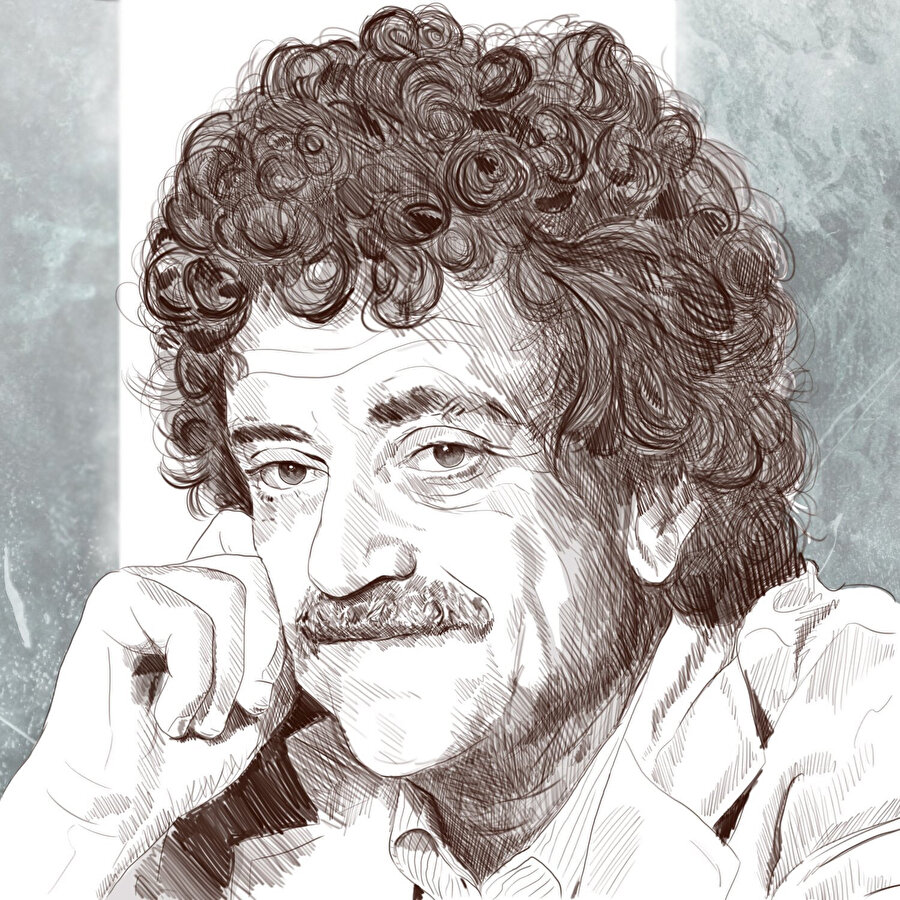He studied biochemistry but became a writer: Who is Kurt Vonnegut Jr?
When Slaughterhouse No: 5 was published in 1965, it included its author in the list of great writers of American literature. The book, which became the number one "best seller" in a short time, made its author a cult author.

Not to mention his curly hair, deep bags of fatigue under his eyes, and the appearance of a philosophy professor who looks more like a retired movie actor than a writer, and of course, doesn't work anymore. Vonnegut became the idol of American students, especially in the 70s, with his novels that have become classics of American counterculture. Nearly all American students had his books in the back pockets of their blue jeans. And increasingly all the youth of the earth…
Kurt Vonnegut (November 11, 1922 – April 11, 2007) was an American writer and humorist known for his satirical and darkly humorous novels. In a career spanning over 50 years, he published fourteen novels, three short-story collections, five plays, and five nonfiction works; further collections have been published after his death.
He was born in 1922 in Indianapolis, the youngest son of a German-American family. When he was born, the world had emerged from one war and was preparing for another new war. The fact that he was born into a family with a sense of art undoubtedly contributed to him charting his path. But the wounds undoubtedly opened up. He started writing in high school. He went to college and left. His mother's suicide during the ramblings of his 20s was his first encounter with death.
He left university in 1943 and voluntarily enlisted in the US Army. He was soon sent to Europe, into the heart of the war. His unit was defeated and he was lost in the battle line with a few of his friends. Then he was captured. Sent to Dresden. He was destined to work in underground bunkers. His mission helped him escape the destruction of Dresden unscathed, which he would later refer to as "a work of art".
He got married after the war. He worked a number of jobs for a while in Chicago. Then he finished his master's thesis at the university. The thesis was defended on the board. It was unanimously rejected. This man, who wrote novels, screenplays, stories, plays, and many other things in his end life, had turned his eyes to the visible world, that is, to accept madness. He objected to the frenzy in everyone's reasonable behavior, where meaning was swamped.
After a lot of work, he must have realized that he could only heal the wounds that the war had inflicted on his soul, if not his body, because he published his first book, The Automatic Piano, in 1952. This first novel, inspired by Brave New World, was a utopian satire. The Automatic Piano was followed by Titan's Sirens in 1959 and the Night Mother in 1961. Vonnegut was taking revenge on the world he witnessed, and in 1963 he published his first major novel, The Cat's Cradle, which would later be taught in high school literature classes. Cat Cradle would be counted as a master's thesis upon the call of the university board, which had previously unanimously rejected it.
After Cat's Cradle, Vonnegut came up with an extraordinarily shocking book that had a huge impact and broke the sci-fi label. When Slaughterhouse No: 5 was published in 1965, it now included its author in the list of great writers of American literature. The book, which became the number one "best seller" in a short time, made its author a cult author. So much so that the book became an inspiration for opponents of the Vietnam War. While it caused great repercussions, some libraries and schools accepted the book as banned because of "violent scenes".
After the publication of Slaughterhouse No: 5, which he brought from Dresden, Vonnegut fell into a deep depression in the shadow of the controversy. After all, such an echo does not happen to every book in world literature. And Vonnegut said he would no longer write a book.
And a passion for playwriting. A lot of things went through his back then. A suicide attempt, a divorce, a remarriage. Other books. And another rewrite release announcement.
After quitting these jobs, he wrote articles for In These Times. Political stuff. Yes, he was a fiction acrobat. Yes, he used the language well. Yes, irony, yes humor. Yes, he was born into a harsh and cruel world. He had no choice but to use absurd humor to criticize the world. Let's not deviate from justice while clapping. I beg your pardon, dear reader. But America's scavenger of conscience was no more than a good fiction writer, Vonnegut. What happened next? The man who had survived so many wars had been enslaved so much, succumbed to old age. A week before his death in 2007, he fell and hit his head.
